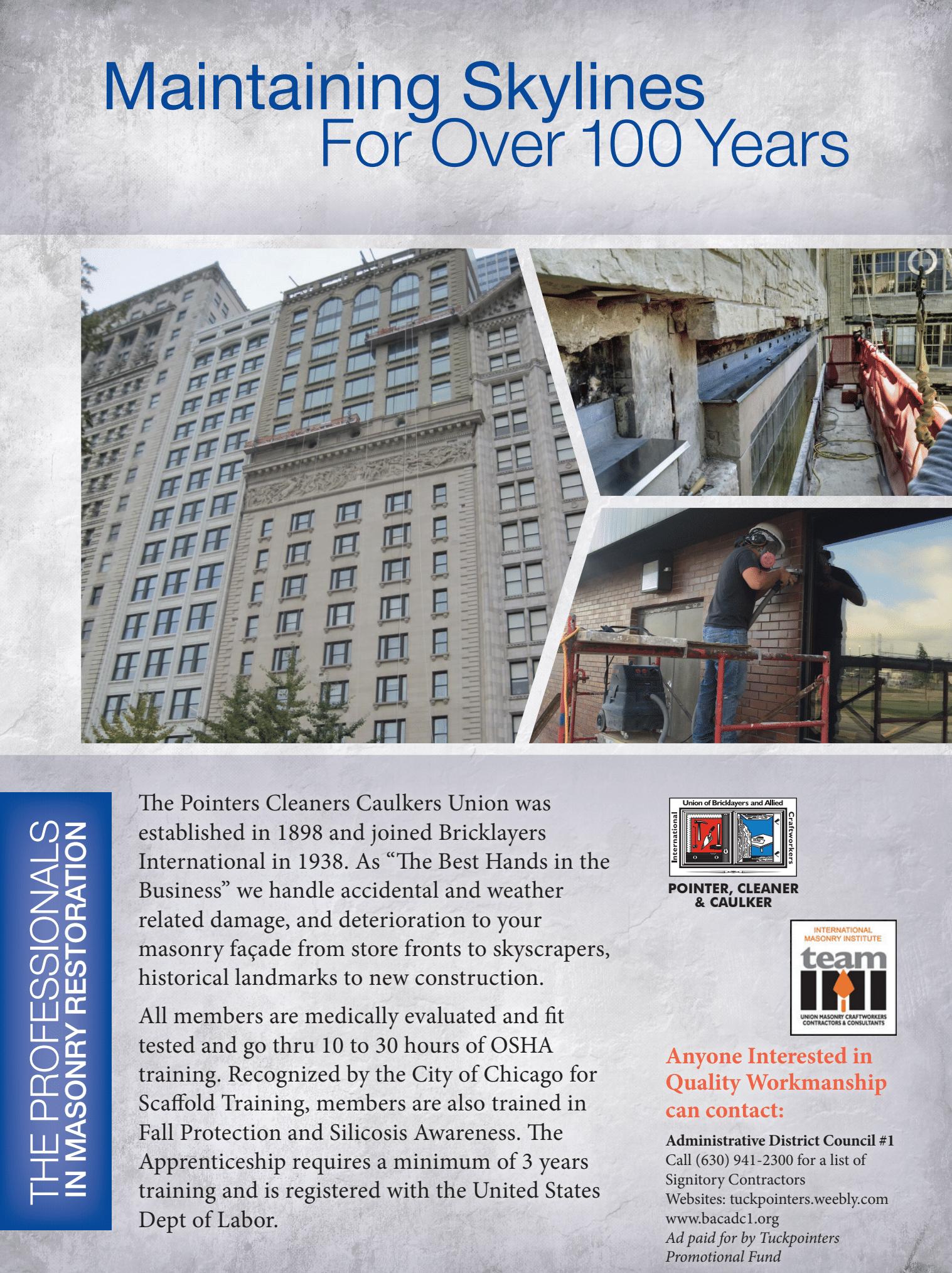ASSET/PROPERTY MANAGEMENT FIRMS
CONSTRUCTION COMPANIES/GENERAL CONTRACTORS
ECONOMIC DEVELOPMENT CORPORATIONS
FINANCE FIRMS
RE LAW FIRMS

‘Very competitive marketplace’:

ASSET/PROPERTY MANAGEMENT FIRMS
CONSTRUCTION COMPANIES/GENERAL CONTRACTORS
ECONOMIC DEVELOPMENT CORPORATIONS
FINANCE FIRMS
RE LAW FIRMS

‘Very competitive marketplace’:
By Brandi Smith
Chicago’s industrial real estate market is off to a fast-paced and focused start in 2025 with completed transactions to date concentrated in key submarkets and below the 200,000-squarefoot range. Developers and brokers are seeing both resilience and selectivity across the region, especially in areas like DuPage County and near O’Hare International Airport.
Two industry leaders – Kelly Disser, Executive Vice President with the Industrial Services Group at NAI Hiffman, and Aaron Martell, Executive Vice President of the Central Region at Logistics Property Company –say confidence remains high despite macroeconomic headwinds and shifts in development trends.
“We continue to see strong demand in the areas where we focus and some sales and leases where we represent the property owners have achieved new price level/ unit pricing records. The second and third quarters of 2025 could be very interesting,” Disser said. “While the first 60 days of 2025 most transaction volume was

PUBLISHER
Mark Menzies menzies@rejournals.com 312.933.8559
MANAGING EDITOR
Dan Rafter drafter@rejournals.com
VICE PRESIDENT OF SALES & MW CONFERENCE SERIES MANAGER Ernie Abood eabood@rejournals.com
VICE PRESIDENT OF SALES Frank E. Biondo Frank.biondo@rejournals.com
CLASSIFIED DIRECTOR
Susan Mickey smickey@rejournals.com
Chicago Industrial Properties® (ISSN 1546-377X) is published bi-monthly for $59 per year by Real Estate Publishing Corporation, 1010 Lake St Suite 210, Oak Park, IL 60301. Contact the subscription department at 312.933.8559 to subscribe. © 2025 by Real Estate Publishing Corporation. All rights reserved. No part of this publication can be reproduced or transmitted in any form or by any means, electronic or mechanical including photocopying, recording or by any information storage or retrieval system.
Dan Barrins Associated Bank
Ron Behm Colliers International
Susan Bergdoll CRG
Corey Chase Newmark
Dan Fogarty Stotan Industrial
Barry Missner The Missner Group
Adam Moore
First Industrial Realty Trust Inc.
Joe Pomerenke
Arco/Murray National Construction Company, Inc
Adam Roth NAI Hiffman
Mike Yungerman Opus Group
1
‘Very competitive marketplace’: Chicago’s industrial real estate market is off to a fast-paced and focused start in 2025 with completed transactions to date concentrated in key submarkets and below the 200,000-square-foot range. Developers and brokers are seeing both resilience and selectivity across the region, especially in areas like DuPage County and near O’Hare International Airport.
4
‘No signs of retreat’: Chicago industrial investors double down on strategy in 2025 Chicago’s industrial investment market isn’t just holding its ground – it’s sharpening its edge. Despite broader market caution, the sector kicked off 2025 with momentum that’s proving hard to ignore.
6
Making room for industrial infill, finding ways to maximize existing urban infrastructure supports sustainable growth With a steady march of employees returning to downtown and suburban offices nationwide, it’s an important time to take a closer look at the upside of infill development.
8
Powering the digital real estate boom: Inside Chicago's data center construction revolution Few sectors are experiencing more explosive growth than data centers in commercial real estate today.
10
CRE Future Leaders: DarwinPW Realty’s Ali Nix Ali Nix is an associate at Elmhurst, Illinois-based DarwinPW Realty/CORFAC International. She’s also a rising leader at the firm. We asked Nix about what inspired her to begin a career in commercial real estate, what she enjoys about the industry and her goals.
12
COMMERCIAL SERVICES
ASSET/PROPERTY MANAGEMENT FIRMS
CONSTRUCTION COMPANIES/GENERAL CONTRACTORS
ECONOMIC DEVELOPMENT CORPORATIONS
FINANCE FIRMS
RE LAW FIRMS

By Brandi Smith
Chicago’s industrial investment market isn’t just holding its ground – it’s sharpening its edge. Despite broader market caution, the sector kicked off 2025 with momentum that’s proving hard to ignore.
“The first quarter set a solid foundation to carry that momentum forward,” said Robin L. Stolberg, Executive Director and Head of Acquisitions at Clear Height Properties. “Lease renewals, vacant space absorption and strategic new acquisitions have all contributed to our growth.”
With more than 1.5 billion square feet of industrial stock, Chicago continues to offer the scale and diversity institutional and local investors need while maintaining a balanced mix of supply and demand. Net absorption remains positive, vacancies are manageable and new construction is easing in a way that supports property values.
“We are not seeing distressed sales or financing-driven motivated sellers,” Stolberg said. “While vacancy rates have increased and net absorption has decreased, these metrics remain well below historic and national averages.”
That said, today’s buyers are not onesize-fits-all. Chicago’s industrial investment market is being powered by a specific mix: strategic owner-users, value-driven buyers and cautiously sidelined core capital.
“Active buyers include local and national investors as well as owner-users who continue to play a significant role in the Chicago market,” Stolberg said. “If an industrial property is single-tenant, under 300,000 square feet and move-in ready with minimal capital investment required, there is a strong likelihood that an owner-user will be among the bidders.”
Institutional investors haven’t pulled back, either. Many still view Chicago as an undervalued, centrally located alternative to higher-priced coastal markets.
“Institutional investors remain bullish with no signs of retreat,” Stolberg said. “The fundamentals of the Chicago industrial market remain solid. Rents and property values are lower compared to coastal markets, supply and demand are in balance and Chicago continues to serve as a central distribution hub for national supply chains.”
That dynamic, however, splits sharply when it comes to investor profiles. According to Kevin Mohoney, Vice President at Molto Properties, it’s a value-add investor’s market – for now.
"Chicago’s industrial market continues to see positive net absorption, meaning more space is being leased than vacated. Property values remain strong, and financing constraints typically surface only when values decline—a trend we have yet to see in any meaningful way."

“Value-add investors are still aggressively pursuing well-located, functional assets that feature below-market rents and can be acquired at an attractive basis relative to replacement cost,” Mohoney said. “Conversely, core investors remain cautious and deals of this profile are more challenging to transact at attractive pricing. This is especially impactful because core capital is the grease that keeps the engine running. Until it returns, we won’t see a meaningful improvement in capital market conditions.”
Still, disciplined firms with strong operational experience are already positioning themselves for that next phase of growth.
“There is no doubt that capital and tenants are becoming more discerning on where they commit their resources and

this dynamic will create opportunities for the best-in-class groups like Molto,” Mohoney said.
That approach is echoed by Clear Height, where acquisitions remain firmly on the table – just not at any price.
“We are more committed than ever to expanding our Chicago portfolio and capitalizing on the opportunities ahead,” Stolberg said.
Despite tighter capital markets, both executives emphasized that Chicago’s industrial sector remains resilient. There is no wave of distressed sales looming and while vacancies have ticked up, they’re still historically low and in line with a healthy, functioning market.
“Chicago’s industrial market continues to see positive net absorption, mean-
ing more space is being leased than vacated,” Stolberg said. “Additionally, tempered new construction is keeping inventory levels in check. Property values remain strong, and financing constraints typically surface only when values decline—a trend we have yet to see in any meaningful way.”
Molto, a privately held real estate firm with deep roots in the industrial sector, is already looking beyond the current cycle. The firm continues to target logistics-driven tenants, regional manufacturers and distribution users who need proximity and functionality more than trendy bells and whistles.
“While we’re still managing through difficult market conditions, the recalibration of our industry was necessary and over time will benefit the best owners and operators of real estate,” Mohoney said.
Stability is the name of the game and Chicago delivers. For tenants, the region offers access to 25% of the U.S. population within a day’s drive. For investors, the city provides predictability, scale and pricing that allows for growth.
“Demand is stable. Vacancy rates remain low. Leasing activity is healthy,” Stolberg said. “The fundamentals that make Chicago a top-tier industrial market remain intact.”
That blend of operational excellence, tenant demand and a well-calibrated supply pipeline makes 2025 a year to watch – not for dramatic swings, but for subtle but steady moves by firms poised to outperform.
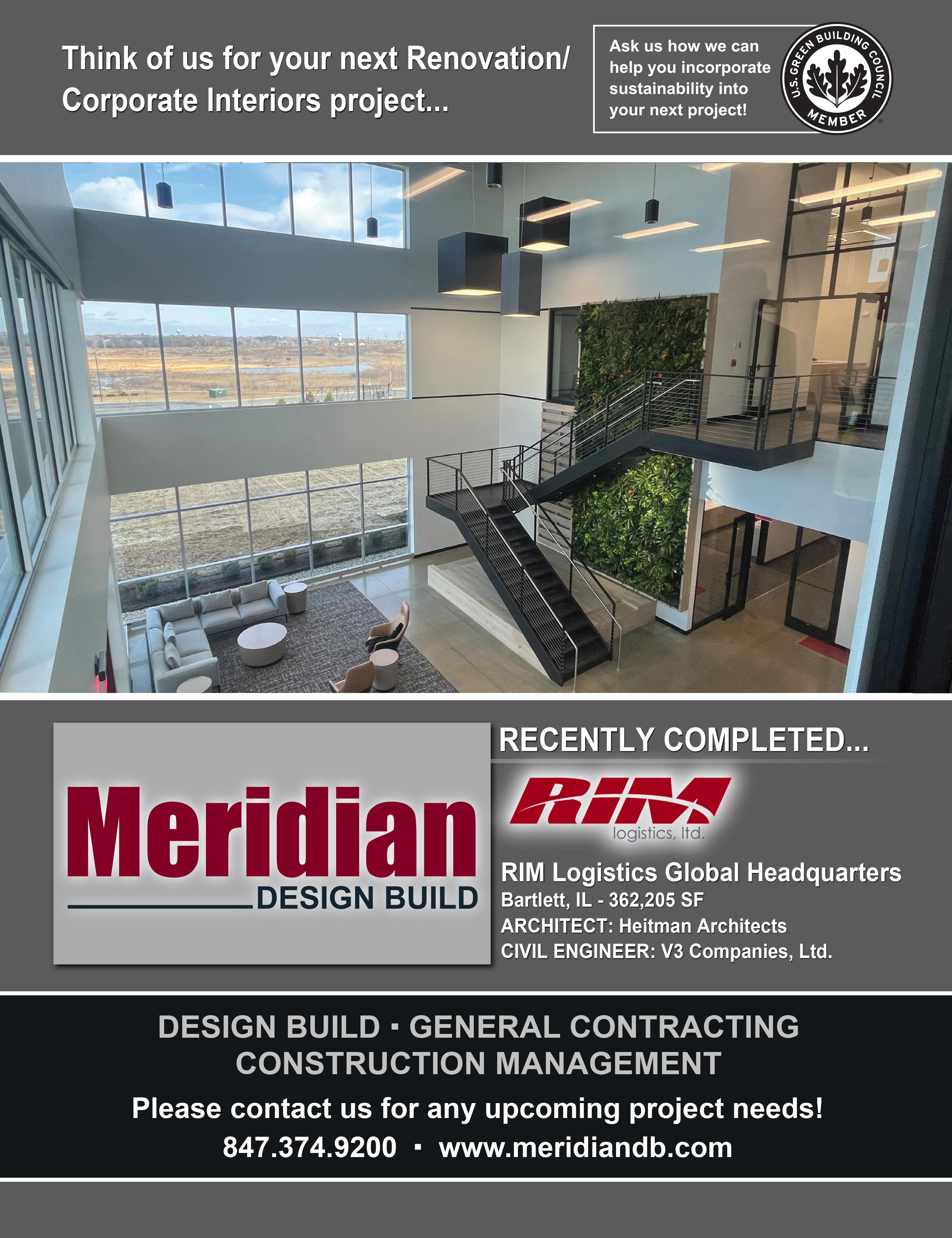
By Mike Robinson and Jim Caesar, Opus
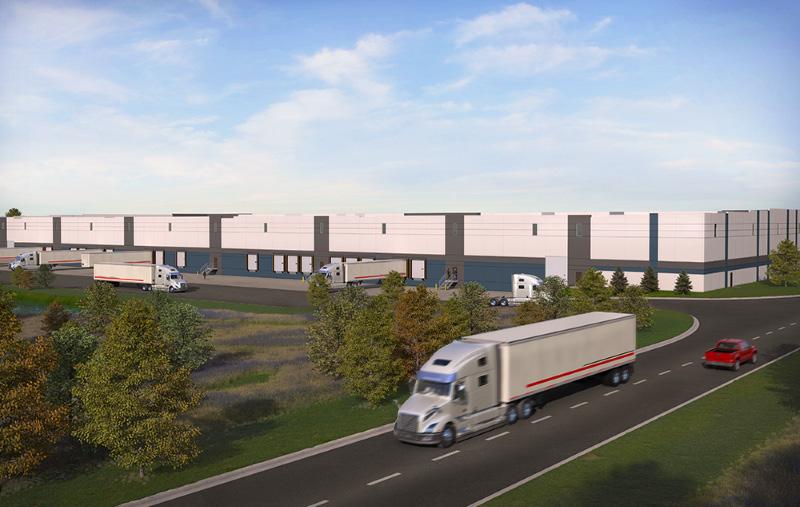
With a steady march of employees returning to downtown and suburban offices nationwide, it’s an important time to take a closer look at the upside of infill development. As existing offices are slowly filling up again with workers and/or being converted to other uses, industrial redevelopment will be an important part of this complex urban revitalization plan to prevent sprawl, increase access to existing infrastructure and boost vital property tax revenue just when our urban cores need it the most.
However, as with all property development, it takes bold vision and collaboration to backfill these unique parcels scattered throughout our metro areas. And in addition to housing, retail or office, industrial spec and build-to-suit developments are a great solution for the potential of urban infill, especially in major cities with little room to expand, like Chicago and its urban suburbs.
A variety of market and economic conditions are driving this growing interest in urban infill. Buyer demand is also very strong in these core areas, showing that
infill properties are poised to outperform properties outside of infill areas.
According to BKM Capital Partners, “regardless of how U.S. economic growth and industrial tenant demand perform in 2025, the ongoing scarcity of smaller [urban] industrial space is likely to persist throughout the year and beyond.”
In fact, BKM states that the 23 million square feet of small industrial space currently under construction across the country represents less than 0.3% of the existing stock of industrial property nationwide.
It’s easy to see why. Infill automatically appeals to a larger pool of tenants given its strategic position at the core of vibrant metro areas. Furthermore, industrial infill can support a community’s larger revitalization goals and a desire to offer more quality buildings for discerning businesses looking for greater metro-area access.
Hurdles to overcome
Despite the rising demand, developers and communities need to be prepared
to navigate some of the common challenges seen with infill.
Potential industrial development sites in metro areas often face rezoning pressures as cities also see the value in other uses for the space, including retail, office and housing. Community pressure based on perceived value of one building use type over another can quickly derail any plans for industrial applications.
Concerns regarding noise, lighting, traffic and hours of operation need to be addressed with most industrial developments, ensuring the neighborhood will not be disrupted.
Given these prime locations and their correlating higher land costs, along with the complexities of infill work pushing project costs higher, developers need higher rents for project feasibility. Getting these top of market rents requires the building’s features to be at the top of the market to make sure the final product that’s delivered is appealing to users. That, combined with what can be a lengthy approval process to achieve the required zoning for the develop-
ment, and with the overall community sensitivities, create many challenges that most infill project teams need to be prepared for.
Developers can mitigate most of the concerns through strong community engagement and collaboration with city officials. Applying sustainable building practices, conducting proactive noise, lighting and traffic studies, and enhancing the overall area through improved landscaping, storm water drainage and better traffic flow will not only solve immediate building concerns, but deliver upgrades to the local area for challenges that may have existed for decades.
More importantly, successful infill project work begins with early and transparent collaboration with the city. As these projects are often integrated with a community’s long-term economic development and revitalization plan, understanding and sharing a common vision for how infill can help achieve those objectives is key. The more involved and receptive the municipality is with the development plan, the more support developers will foster throughout the entire development process.
Regardless of the challenges infill often presents, community leaders and businesses are getting behind it in a big way, ready to partner with creative and capable developers to find viable solutions for backfill development.
The benefits of infill are too significant to ignore. It starts with the economic boost these developments provide. From job creation, significant real estate tax revenue and supporting area businesses like shops, entertainment and residential, infill has the potential to serve as a key piece to neighborhood vibrancy and wholeness.
On top of that, as brownfield spaces are redeveloped, the community at large benefits from the positive environmental impact the associated remediations deliver. From cleaning up contaminated sites to flood mitigation through better stormwater management systems to greener landscapes, good design can quickly fill in blighted or unproductive
gaps in urban areas with attractive and productive parcels.
This was the case for Opus and its Alsip Park 294 infill project. The city was eager to partner on an industrial solution, and it provided a tax incentive as well as an enterprise zone sales tax abatement to help off-set some of the costs associated with the unique challenges of the site. The 360,000 square foot industrial development located just over 20 miles from downtown Chicago, filled a void for the area with not only Class A industrial warehouse space, but remedied a variety of previous challenges with better traffic flow, clearing debris and offering a longterm ground water drainage solution that was plaguing the area.
The rapid growth of e-commerce business and the more recent advancements in material handling and automation practices have allowed logistics and storage to soar in industrial properties.
Traditional buildings with shorter clear heights are becoming obsolete as building operators can go more vertical than before doing more within a smaller footprint and thus requiring less land. Density of racking through robotics, automated cranes and other high-tech

material tracking methods create a more efficient use of space as well.
These advanced industrial storage solutions, now pushing building clear heights to 32 - 40-feet typically (and sometimes higher), are prime for the infill market as they unlock more urban and smaller sites to be utilized, which may have previously not been an option for users.
As this trend continues, we’ll see even greater need for narrower yet higher

industrial space which are closer in proximity to end users and consumers. This allows businesses to cut their transportation costs considerably as their logistics operations can now sit just blocks away from retailers and customers instead of miles.
Still, no matter how functional and well positioned an infill building is, partnering with a well-educated broker is vital to the ultimate success of the project. Partnering with a broker who truly understands
the users and their challenges will help all involved achieve their real estate goals.
Given the various capabilities and expertise needed to maximize the potential of these infill industrial buildings, we’re going to see developers with a track record of comprehensive design-build offerings leading the way. Crafting a building to suit the site, through a maze of complex design and engineering needs, coupled with the ability to partner closely with city and governmental agencies, will be required.
Industrial infill, while gaining serious momentum in recent times, is proving to be a smart and sustainable commercial real estate solution as businesses continue to find new, more efficient ways to meet their operating needs.
Jim Caesar is Regional Vice President of Construction for Opus, where he manages the design-build construction operations for the Chicago market, including Michigan and Wisconsin.
Mike Robinson is Vice President of Real Estate Development for Opus, where he identifies, secures and develops projects in Chicago, southeast Wisconsin, northwest Indiana and Michigan.

By Elbert Walters III, Executive Director, Powering Chicago
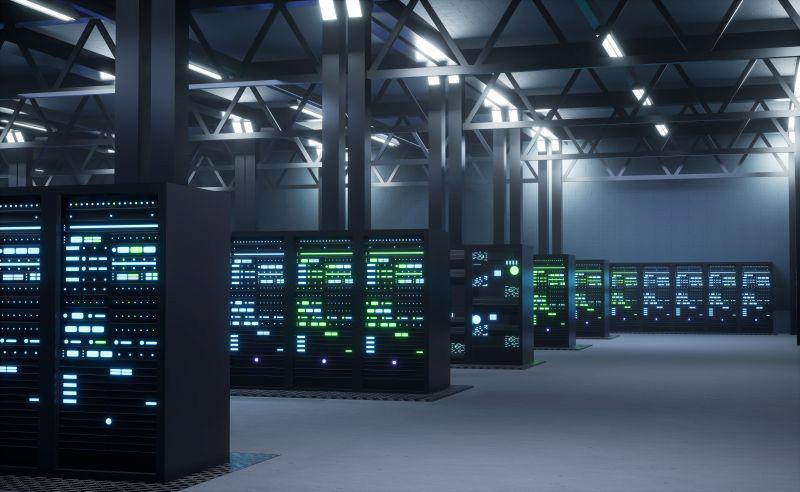
Few sectors are experiencing more explosive growth than data centers in commercial real estate today. With Chicago emerging as a top-five data center market nationally—experiencing a 17% year-over-year capacity increase in 2024—the infrastructure behind these digital fortresses deserves closer examination.
Behind every successful data center development lies a complex web of electrical systems that determines whether a facility will thrive or fail in our increasingly digital economy.
The critical infrastructure powering modern business
The physical systems that support our essential applications often remain unnoticed, yet they are crucial to our daily operations. Data centers form the core of this infrastructure, ensuring that everything from communications to financial transactions operate smoothly. They
provide a dedicated space for storing, processing and sharing critical information that modern businesses rely on.
In essence, data centers secure an organization's most crucial data. These facilities are designed to support a wide range of services—from facilitating cloud operations to powering devices that connect our world. They ensure that digital processes remain uninterrupted through advanced systems that manage vast information flows.
A key aspect of data center design is redundancy. These facilities integrate multiple backup systems to maintain continuous operations during unexpected outages or transitions between power sources. Utility lines, generators, and battery arrays work together to provide a constant power supply. This layered approach means that if one component fails, another immediately takes over, virtually eliminating downtime in our always-on environment.
Building a data center requires meticulous planning and flawless execution. It begins with comprehensive virtual design work that models every system component before on-site construction begins, ensuring that each element—from power distribution to cooling systems—is optimized for efficiency and resilience.
Qualified electrical contractors play a vital role in this process. These experienced professionals bring the technical expertise and industry certifications needed to ensure that every phase of construction meets the highest standards of quality, reliability, and safety. Their collaboration with design teams help keep projects on schedule and within budget while integrating advanced systems that minimize downtime.
The T-5 Data Center in Elk Grove Village exemplifies the sophisticated electrical work central to these developments. Currently serving multiple enterprise clients across 174,000 square feet with 17 megawatts of capacity, the facility is undergoing a strategic expansion to reach 30 megawatts—a 76% increase in power capacity that will significantly boost its commercial value.
Gibson Electric, a leading Chicago-area electrical contractor, has been integral to this project's success.
Their team oversaw:
• Installation of N+1 redundant power systems ensuring 99.999% uptime reliability
• Coordination of eight 3-megawatt diesel generators with synchronized startup sequences
• Integration of uninterruptible power supply (UPS) systems with millisecond response times
• Implementation of advanced power distribution units (PDUs) with remote monitoring capabilities
• Design and installation of sophisticated grounding systems to protect sensitive IT equipment
This complex electrical infrastructure represents approximately 35% of the total construction budget—underscoring how critical proper electrical planning and execution are to data center investments.
Additionally, the project has benefited from Chicago's highly trained, unionized workforce. While national data shows that data centers staffed by certified electrical professionals experience 27% fewer operational disruptions, Chicago's specialized teams have delivered even more impressive results. Local projects have consistently demonstrated 40% faster deployment timelines when utilizing union-trained electrical profession-
"Understanding the value proposition of quality electrical infrastructure is essential for commercial real estate investors and developers."
als—a key consideration for developers in this competitive market.
Real estate implications: The investment value of quality construction
Understanding the value proposition of quality electrical infrastructure is essential for commercial real estate investors and developers. Data centers with properly engineered electrical systems command premium leasing rates—typically 15-20% higher than facilities with basic
configurations. This premium directly translates to stronger ROI and higher property valuations.
Furthermore, the expandability engineered into modern data center electrical systems allows for phased development that can follow market demand. This flexibility enables property developers to maximize their investment potential while minimizing upfront capital expenditures.
Constructing robust data centers involves meticulous planning, quality construction, and skilled labor to ensure that facilities meet current operational needs while accommodating future technological advancements. This process relies on coordinated design, engineering, and electrical construction efforts to provide reliable and resilient IT infrastructure.
As Chicago's data center market continues its projected 22% growth through 2026, investments in quality construction practices, experienced workforces, and effective project management contribute to a dependable foundation for these digital real estate assets. This approach is critical for municipalities, facility managers, business leaders, and property developers who rely on uninterrupted digital operations.
To learn more about these practices and the evolving landscape of IT infrastructure, watch episode 9 of Powering Chicago's YouTube series, "The Power of Better."
Elbert Walters III is executive director of Powering Chicago, a Chicago-based electrical industry labor-management partnership.
“ Knowledge of Midwest industrial real estate is DarwinPW’s strength. We want to share that strength and knowledge with you.”
For over 45 years, DarwinPW Realty/ CORFAC International has been a leader in industrial and commercial real estate. The company specializes in brokerage, property management, investment and development services primarily in the Midwest. DarwinPW Realty’s highly qualified professionals are problem solvers and utilize a breadth of tools and knowledge to serve our clients best.
George Cibula, SIOR Managing Broker


200,000 and smaller, though in recent weeks we have seen the activity and interest in spaces over 200,000 square feet dramatically increase.”
At Logistics Property Company, the year kicked off with a major land acquisition at 2700 York Road in Elk Grove Village, just west of O’Hare. The 5.9-acre site will be developed into a 123,000-squarefoot rear-load warehouse with 16 dock doors, two drive-in doors and 125 auto parking spaces. The site offers immediate access to I-390 and the under-construction I-490 extension, placing it in one of the most logistically desirable locations in the region.
“This is a great win,” Martell said. “This was a fast-moving deal in an exceptional location and we’re excited to break ground on the project soon.”
Construction on the facility is slated to begin in May with delivery expected in Q2 2026. The development team includes Jacob & Hefner Associates as the civil engineer and Ed Lowenbaum of Cresa, who brokered the land sale.
As the pipeline of big-box users moderates, demand for smaller and mid-sized industrial space is filling the gap. Disser said the strongest activity this year has been for spaces of less than 200,000 square feet with some deals becoming competitive among multiple tenants.
“There are some submarkets where the velocity and transaction volume is not as strong as what we have witnessed and facilitated in the DuPage industrial market,” Disser said. “However the vacancy rates in those submarkets still remain at or near historical lows – really with only one exception throughout Chicagoland.”
That strength is fueling optimism across both speculative and build-to-suit (BTS) development, although the mix between the two has shifted noticeably in the past few years. During the postCOVID boom, speculative development dominated the landscape. In 2021 alone, roughly 85 % of the 38 million square feet delivered in Chicago were speculative projects. Today, the ratio has swung in favor of BTS.
“There is more BTS activity today in Chicagoland than spec,” Disser said. “Greater than 50 % of the buildings under construction today are BTS.”
He doesn’t anticipate a wave of new product flooding the market, even with fundamentals remaining strong. Developers are being selective, particularly with the rising costs of capital and construction. Infill sites remain scarce and command a premium.
“The spec development remains a very competitive marketplace and has some challenging supply dynamics – though infill leasing demand is strong,” Disser said. “I would not anticipate a great deal of additional new development or
"It is healthy, resilient and has absorbed major shocks incredibly well in my opinion – to date. The marketplace changed dramatically as we moved through and out of COVID-era policy and dynamics. Following that the FED raising interest rates significantly through 2022 had shut down the development pipeline nearly completely."

a flood of supply to hit the market. One of the key implications of that, is that those who are able to get a building out of the ground, I believe will be incredibly successful. It feels reminiscent of the period from 2013- 2020; the market was strong and steady. There was not as much new construction but the leasing demand was there. It was healthy.”
Speculative development still plays a central role at Logistics Property Company. Martell said the company remains confident in the upside of its current pipeline.
“Over the last few years, the majority of our business has been speculative,” he said. “We believe in continuing to identify good sites for development as the 2025 vintage product will provide great returns.”
Logistic Property Company’s newest project in Elk Grove Village is a reflec -

tion of that philosophy: a high-quality site in an infill location with strong access to labor and transportation networks. While the firm is currently focused on delivering that project, it’s actively hunting for more land in the region.
“We continue to focus on finding great opportunities and are currently looking for sites five acres or larger,” Martell said.
For investors and institutional capital, the current market may lack the boom-style absorption of 2021, but it’s also showing discipline and consistency, even as the wider economy resets.
“It is healthy, resilient and has absorbed major shocks incredibly well in my opinion – to date,” Disser said. “The marketplace changed dramatically as we moved through and out of COVIDera policy and dynamics. Following that, the FED raising interest rates
significantly through 2022 had shut down the development pipeline nearly completely.”
That pause, Disser said, allowed the market to recalibrate. As of early 2025, participants on both the buyer and seller sides are reengaging, even if the pace is tempered. Capital remains interested—especially in proven locations where tenant demand is visible.
“The Chicago market continues to perform very well with limited industrial supply, strong leasing metrics and rent growth,” echoed Martell.
As the year progresses, both firms are keeping an eye on user demand, capital markets and construction costs, but neither is sitting still. Disser’s team at NAI Hiffman is juggling multiple leasing assignments for some of the region’s most active owners.
“We have three significant leasing assignments with three of the best industrial owners and operators in their field, which our team is focused on leasing on a daily, if not hourly, basis,” Disser said. “We look forward to having our clients’ buildings leased and being a part of those wins with them.”
Despite tighter site availability and a more cautious investment climate, both developers and brokers are staying focused on high-performing submarkets, infill access and user-specific needs – whether speculative or tailored.
“Rent growth and demand will continue to be strong in 2025,” Martell said.
In other words, the fundamentals haven’t faded, they’ve just evolved.



Ali Nix is an associate at Elmhurst, Illinois-based DarwinPW Realty/ CORFAC International. She’s also a rising leader at the firm. We asked Nix about what inspired her to begin a career in commercial real estate, what she enjoys about the industry and her goals.
Here is what she had to say.
Tell us about your background. Where did you grow up? Where did you go to school?
I grew up in the La Grange area outside of Chicago. I went to Auburn University in Auburn, Alabama, where I studied finance. War Eagle!
How did you get your start in the industry?
In my senior year at Auburn I set up as many phone calls and coffee meetings as I could with people in the commercial real estate world. At the time, I really didn’t know all the different avenues and knew nothing about industrial. I was connected
Ali NIx and her parents.
Photo courtesy of DarwinPW Realty.

with Marc Hale and was able to shadow him over winter break, and started that June after graduating.
Did you have a mentor who helped you get on your feet, or is there someone you turn to now for support?
Marc Hale has been my mentor since I started at Paine Wetzel, teaching me the
ins and outs of the business. It’s been a great experience working alongside him. The entire team at DarwinPW Realty is incredibly knowledgeable, and I’m grateful for their guidance, advice and support through the ups and downs of brokerage.
I also turn to my parents for their perspective since they’re in the wholesale produce industry. It’s helpful to get their input on marketing. For example, I’ll ask my dad “Would you open this type of email or mailer? What information would you want to know?” Their feedback helps me navigate the gap between Gen Z and the typically older school clients we work with.
What does an average day at work look like?
Every day is different, which I love. Some days are spent in the office prospecting, researching, reporting and answering emails. Other days are filled with back-toback tours, meetings and flying around the city!
What do you like most about your job?
I like that everyday is different and an opportunity to learn. It’s fascinating to walk through different buildings and see firsthand how things are made. I also value the opportunity to connect with clients who have a deep, specialized knowledge of their industries.
Looking to the future, what do you hope to work on/achieve that you haven’t already?
I’m looking forward to working on new and exciting deals and continuing to learn.
How do you spend your time away from the office?
Most of my time away from the office is spent at the barn. I’ve been an equestrian for 19 years, riding and competing in the sport of eventing. My barn is in Monee out in the cornfields. The focus on training and the change in scenery from the city takes my mind fully off the day and keeps me grounded.



ALVAREZ & MARSAL PROPERTY SOLUTIONS
205 W Wacker, Ste 516
Chicago, IL 60606
P: 312.606.0966
Website: ampsre.com
Key Contacts: Kevin Halm, Managing Director, khalm@ampsre.com; Pete Kontos: Managing Director, pkontos@ampsre.com
Services Provided: AM-PS provides property management, project management, and brokerage services to owners and occupiers of office, retail, and industrial real estate. Company Profile: AM-PS was born out of the desire to take the strategic mindset and processes of the renowned business restructuring firm Alvarez & Marsal and reframe them for the commercial real estate world. Our approach solves problems, improves performance, and unlocks value for our clients. Our work has positively impacted real estate and those who interact with our properties nationwide.
9450 West Bryn Mawr Ave., Suite 120 Rosemont, IL 60018
P: 847.615.1515 | F: 847.615.1598
Website: pccdb.com

Key Contacts: Mark L Augustyn, COO, maugustyn@pccdb.com, James A.. Brucato, President, jbrucato@pccdb.com
Services Provided: Principle specializes in commercial and industrial property and is committed to providing clients with the highest level of design/build construction services with an absolute dedication to each project.
Company Profile: Design/Build General Contractor established in 1999 specializing in the design and construction of Build-to-Suit, Speculative, Retail, Food Processing, Expansions/Additions, Tenant Improvements, & Specialty Facilities. Principle also has extensive experience in interior improvements, site evaluation, due diligence, and value engineering.
Recently Completed Projects include:
• 282,588 SF dry-cleaning facility for Tailored Brands, at 2000 Deerpath Rd. in Aurora, IL.
• 31,200 SF facility for Alvil Trucking, at 2570 Millenium Dr. in Elk Grove Village, IL
• 6,200 SF Warehouse for Superfast Trucking, at 1001 Raddant Rd. in Batavia, IL
OUTLOOK MANAGEMENT GROUP, LLC AMO
S74 W16853 Janesville Road
Muskego, WI 53150
P: 414.369.3511 | F: 414.435.0251
Website: outlookmgmt.com

Key Contact: Ray Balfanz, President/Partner, ray@outlookmgmt.com
Services Provided: Full service property and asset management services, financial analysis and reporting; budget preparation and expense reconciliations; lease administration; construction management; preventative maintenance and consulting services.
Company Profile: Outlook Management Group, LLC AMO provides comprehensive property and asset management services for all asset classes in multiple states and markets.
Notable Properties Managed: Washington Corners, Naperville, IL; Ironwood Office Park, Glendale, WI; Wood River Condominiums, West Bend, WI; Seven 10 West Luxury Apartments, Chicago, IL; MDJD Aesthetic MOB, Rockford, IL, Ascension Health MOB Milwaukee, WI; Henry Ford Health Systems Pharmacy Services Bldg. in Rochester Hills, MI; Henry Ford Medical Center in West Bloomfield, MI; Baptist Medical Center South, Montgomery, AL; and Lee Memorial Health Systems Building in Fort Myers, FL.
MERIDIAN DESIGN BUILD
9550 W. Higgins Road, Suite 400 Rosemont, IL 60018
P: 847.374.9200 | F: 847.374.9222
Website: www.meridiandb.com
Key Contact: Paul Chuma, President; Howard Green, Executive Vice President

Services Provided: Meridian Design Build provides construction and design/build construction services on a national basis with a primary focus on industrial, office, medical office, retail and food and beverage work.
Company Profile: With a team of in-house professional project managers, Meridian has extensive experience coordinating the design and construction of new buildings, tenant improvements, and additions/renovations from 15,000 square feet to 1,000,000+ square feet. Meridian Design Build has been a Member of the U.S. Green Building Council since 2007.
Notable/Recent Projects: Venture Park 47, Huntley, IL - 729,800 sf speculative industrial facility for Venture One Real Estate. Lion Electric, Joliet, IL - 928,500 sf electric bus / medium duty truck assembly plant for Clarius Partners. Greenwood Truck Terminal, Greenwood, IN - 125 door truck terminal on 43 acres for Scannell Properties.
2000 Center Dr., Suite East C219 Hoffman Estates, IL 60192
P: 847.392.6900
Website: victorconstruction.com
Key Contact: Zak Schuttler, President, ZakS@victorconstruction.com

Services Provided: Victor Construction Co., Inc. manages projects from ground-up site developments to interior buildouts, specializing in retail, industrial, and commercial markets.
Company Profile: Victor Construction Co., Inc. remains a family-owned and operated General Contractor. Having been in business since 1954, our firm has extensive experience managing every aspect of interior construction for the corporate, manufacturing, industrial, and retail sectors.
Notable/Recent Projects: Owens + Minor Distribution – 600K SqFt distribution facility that involved a full LED lighting upgrade, new HVLS fans, 200K SqFt section that required new cooling for medical distribution, an office renovation of 20K SqFt, and a new exterior employee pavilion.
VILLAGE OF HOMER GLEN
ECONOMIC DEVELOPMENT
14240 W. 151st Street Homer Glen, IL 60491
P: 708.301.0632
Website: HomerGlenIL.org
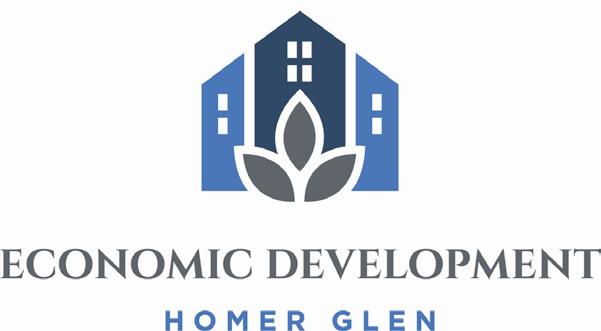
Key Contact: Janie Patch, Economic Development Director, jpatch@homerglenil.org
Services: Resource center for brokers, developers, site selectors and businesses providing space and property inventory, trade area demographics, site selection assistance, custom tours, coordination through entitlement process, business opening process guidance and retention services.
Demographic Info: Strategic Will County location 25 miles southwest of Chicago with two I-355 interchanges between I-55 and I-80. Average household income of $154,800. Trade area population of 83,000. Prime commercial corridors include Bell Road, 143rd Street and 159th Street (State Route 7). 159th Street is improved with 4 lanes and access to Lake Michigan water and sanitary sewer.
Recent CRE Activity: The Villas of Old Oak (46 ranch duplexes) completing full build out. New food specialty and restaurant openings include South Viet, OneZo Boba Tea, Sultan Sweets and Cervantino’s. Restaurant with drive-thru position available at Homer Glen Bell Plaza with Pet Supplies Plus, Dollar Tree and Taco Bell, SWC 143rd/Bell.
OF MICHIGAN CITY
Two Cadence Park Plaza
Michigan City, IN 46360
P: 219.873.1211
Website: www.edcmc.com
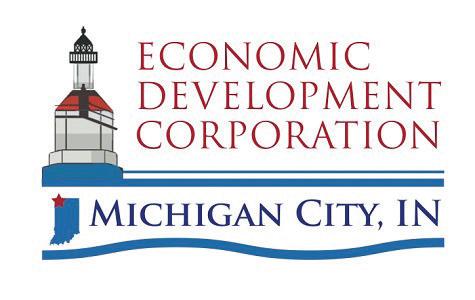
Key Contacts: Clarence Hulse, Executive Director, chulse@edcmc.com
Karaline Cartagena Edwards, Economic Development Manager, kcedwards@edcmc.com
Services/Demographic Info: Up-to-date inventory of commercial buildings, site selection and orientation tours.
Incentives: Tax-Increment Financing, Façade Improvement Grants, Property Tax Abatements, Enterprise Zones, Job Training Programs
Recent CRE Activity: Double Track Northwest Indiana: $1.6 Billion development reducing train travel to Chicago to 60 minutes; The Franklin at 11th St. Station: $100 Million Development with Residential & Retail Space; “You are Beautiful”/SoLa: $311 Million Mixed-Use Multi-Family Development with 235 boutique hotel rooms & 174 Luxury Condos; Burn ‘Em Brewing: $3 Million Expansion project with 30 new jobs.
10000 W. 151st Street
Orland Park, IL 60462
P: 708.364.9131
Website: emarquettebank.com
Key Contact: Gene Malfeo, Senior Vice President, gmalfeo@emarquettebank.com
Services Provided: Full line of Commercial, Business and Real Estate loans customized to your individual needs including: commercial and residential construction loans, commercial mortgages, equipment loans and working capital lines of credit. Company Profile: Marquette Bank started in Chicagoland in 1945 and is still locallyowned/operated. Expect quick decisions, competitive rates, easy application and personal service. Personal/business banking and lending, home mortgages, land trust services, estate planning, insurance services, wealth management and multifamily lending.
SARNOFF PROPERTY TAX
100 N. LaSalle St., 10th Floor
Chicago, IL 60602
P: 312.782.8310
Website: sarnoffpropertytax.com

Key Contact: James Sarnoff, jsarnoff@sarnoffpropertytax.com P: 312.448.5337
Services Provided: Since 1986, Sarnoff Property Tax has been a leading and recognized law firm concentrating solely in the field of property taxation. We help client’s secure favorable taxes in Illinois through property tax appeals, incentives and consulting. Company Profile: Sarnoff Property Tax’s clients include Owners, Developers, Managers, REIT’s, Fortune 500 Companies, Private Equity Firms, etc., in connection with commercial property, high-rise and low-rise apartment buildings, condominium associations and single-family home portfolios.
180 North LaSalle Street, Suite 3010 Chicago, IL 60601
P: 312.917.2307 P: 312.917.2312 | F: 312.596.6412
Website: wvproptax.com
Key Contacts: Francis W. O’Malley, Managing Partner fomalley@wvproptax.com; Jessica L. MacLean, Partner jmaclean@wvproptax.com
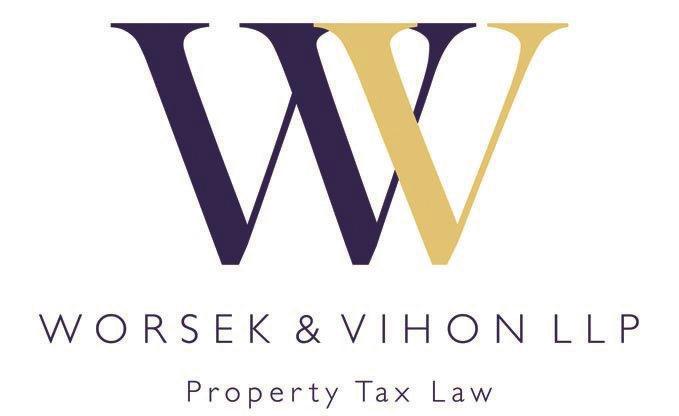
Services Provided: Worsek & Vihon, LLP represents tax payers in Illinois by limiting their property tax liabilities through ad valorem appeals. We have over 40 years of experience and can handle basic to the most complex assessment issues while offering the dependable, personalized attention our clients deserve. We have experience representing owners of all property types. In addition to filing thousands of appeals with the Cook County Assessor, we have been involved in numerous proceedings before various Boards of Review, the Illinois Property Tax Appeal Board, and the Circuit Court of Illinois, and have appeared before the Illinois Appellate and Supreme Courts. Company Profile: Worsek & Vihon LLP, is a team of experienced attorneys singularly focused on real estate tax law. The firm is dedicated to minimizing property tax liabilities through strategic tax portfolio management, well-researched, creative appeal preparation and aggressive advocacy.
1000 N Water Street, Suite 1700 Milwaukee, WI 53202
P: 414.298.1000
Website: reinhartlaw.com

Key Contact: Joseph Shumow, Shareholder, jshumow@reinhartlaw.com
Services Provided: Reinhart is a full-service, business-oriented law firm that delivers innovative, value-added solutions for today’s most important real estate needs, including land use and zoning; tax incremental financing; tax credits; leasing; construction; and condemnation and eminent domain issues.
Company Profile: With the largest real estate practice in Wisconsin and offices throughout the Midwest and across the country, Reinhart’s attorneys offer clients customized real estate insight rooted in broad knowledge and deep experience to help you capitalize on opportunities no matter where you do business.
